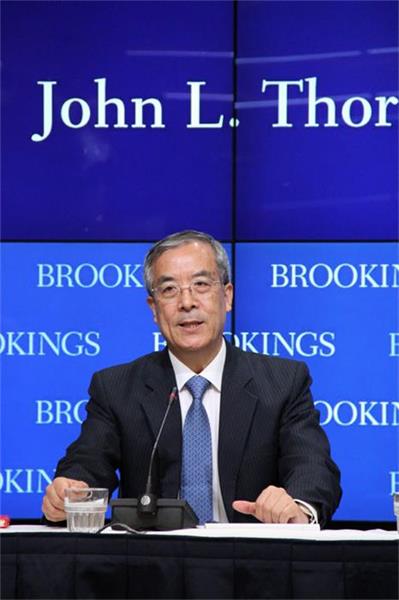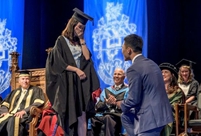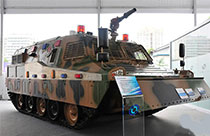


Su Ge, President of China Institute of International Study. [Photo: CRIENGLISH.com]
In about two months, the Chinese President will meet his counterpart, President Barack Obama, at the White House. The meeting is considered by many as an important indicator of future Sino-US relations, and has drawn close attention from the media and academic circles from both sides. Su Ge, President of the China Institute of International Study, says the two countries will continue cooperation no matter what.
"The new model of major country relationship has been a thing talked about by the two presidents. And what does that mean? I think there has been a consensus that both countries would consider building up a relationship would contain non-confrontation which would be based on mutual respect and strive for a win-win end. Therefore, I think that the visit and the summit meeting will open up a new prospect for mutually beneficial cooperation between the two great countries."
Dr. Su made the remarks at a Brookings event, focusing on US-China relations and the Chinese President's upcoming visit.
Many prestigious experts on Chinese issues have joined the event including Richard Bush, director of the Center for East Asia Policy Studies at Brookings Institution, a well-known US think-tank.
In his opinion, during Xi Jinping's visit, the two sides will address concerns ranging from cyber security to East-Asian security, the Asia Infrastructure Investment Bank and so on.
He also suggests the two countries can agree on a work plan focusing on issues that require Presidential leadership. Bush also sees great potential in the cyber area, where the two sides may seal a deal during Xi Jinping's state visit.
"I think that there may be opportunities in the cyber area where there can be agreement at the top on that certain aspects of the cyber realm are off-limits to the activities of the other side. So critical infrastructure seems to be one where there is a mutual interest that neither side will attack the other."
For quite some time, China-US relations have been bumpy. Issues about cyber attacks, an unsettled Bilateral Investment Treaty, and the South China Sea have cast a shadow on Sino-US relations. East Asian international policies specialist Jonathan Pollack warns both sides to be aware of the risks involved if the US and China switch from cooperation to competition.
"Do we see these controversies as simply the growing pains of an evolving and much more complex relationship that need to be intelligently managed over time or are we at the gestational stages of a longer term competition that contains adversarial or quanta adversarial dimensions? The real question would be whether or not there is a sufficiently shared awareness of the risks posed by the latter that it receives the kind of careful attention that it deserves in both policy processes."
In September, Chinese President Xi Jinping will make his first state visit to the US. In addition to New York and Washington, he will also go to Seattle, a port city on the US west coast with a close trade relationship with China.
 Student proposes during graduation ceremony
Student proposes during graduation ceremony China-made special vehicles in exhibition
China-made special vehicles in exhibition Soldiers serving at Liaoning aircraft carrier
Soldiers serving at Liaoning aircraft carrier Bikini beauties lifeguards in river rafting place
Bikini beauties lifeguards in river rafting place PLA soldiers eat raw snake meat in harsh training
PLA soldiers eat raw snake meat in harsh training Kiss contest held in Nanning, SW China
Kiss contest held in Nanning, SW China Yunnan-Myanmar Road: The past and present
Yunnan-Myanmar Road: The past and present Photos of beautiful policewoman become online hit
Photos of beautiful policewoman become online hit Campus belle of Xiamen University gets popular online
Campus belle of Xiamen University gets popular online Belt of possibility
Belt of possibility ‘Abnormal’ stock dip to be probed: CSRC
‘Abnormal’ stock dip to be probed: CSRC TPP’s geopolitical leverage may be inflated
TPP’s geopolitical leverage may be inflated ‘Tiger mothers’ turn out to have deep pockets that fuel kids’ success
‘Tiger mothers’ turn out to have deep pockets that fuel kids’ successDay|Week